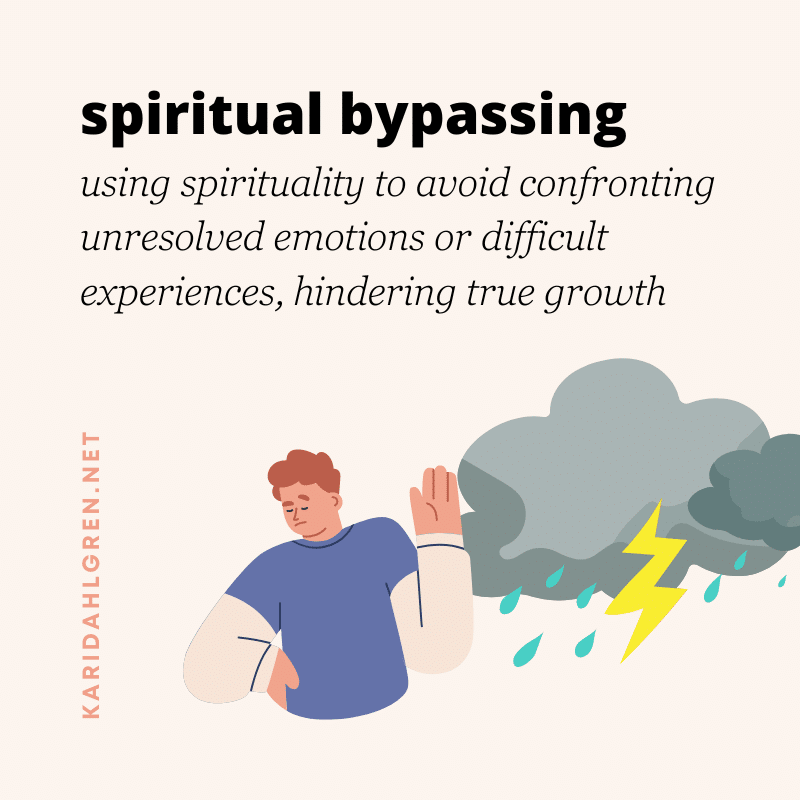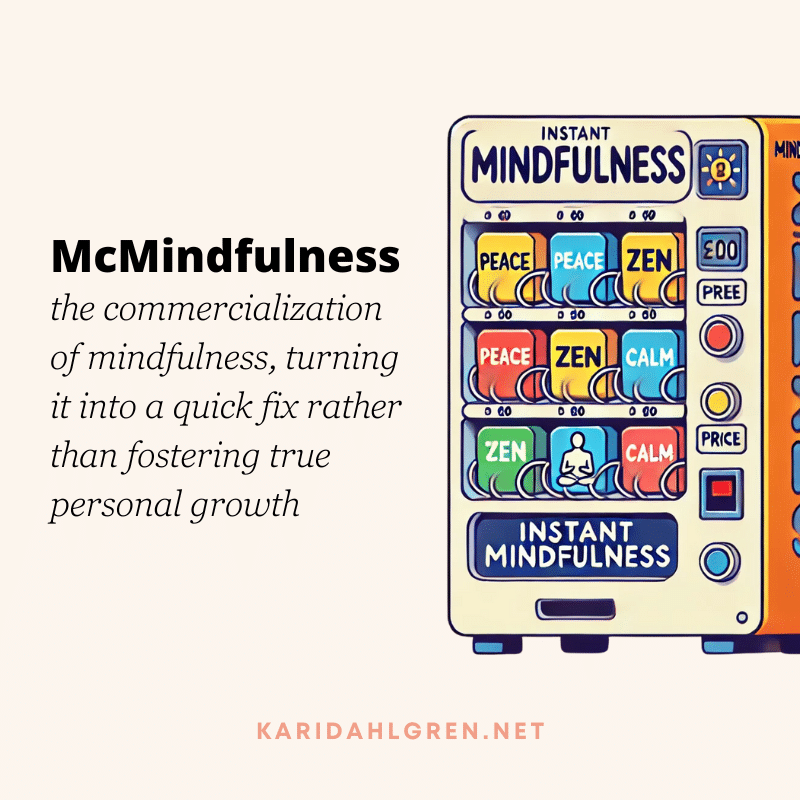
Ever felt like you’re stuck on your spiritual journey, no matter how hard you try? You’re not alone. It’s common to feel frustrated with spiritual development, especially when progress seems slow, stagnant, or seemingly nonexistent.
Despite your best efforts, you might feel like you’re hitting a wall, wondering if you’ll ever experience the growth you seek. But here’s the truth: frustration is part of the process, as annoying and unwanted as that may be. Frustration with spiritual development is not a sign that you’re doing something wrong—it’s actually an indicator that you’re on the edge of deeper growth.
This article will explore why frustration often accompanies spiritual development, common pitfalls that keep us feeling stuck, and practical tips for navigating this challenging yet transformative part of your journey.
For anyone that’s new, my name is Kari and I’m an eating psychology coach. While spirituality might seem outside the scope of my usual work, it's actually a vital part of our overall well-being. That’s why I integrate both psychology and spirituality into my approach, recognizing how deeply they influence each other in the journey toward personal growth.
How Spiritual Development Contributes to Well-Being
Spiritual development isn’t just about reaching enlightenment or finding inner peace—it’s about becoming more connected to ourselves and the world around us. At our core, we crave a deeper sense of meaning and purpose, and spiritual growth helps us navigate life’s uncertainties, find balance, and cultivate inner resilience. Without it, we may feel disconnected or stuck in patterns that no longer serve us.
Research supports these benefits. Studies suggest that spirituality is positively linked to psychological well-being. For instance, a study published in Religions (Basel) highlights how spirituality can deepen our sense of purpose, while Frontiers in Psychology shows that both spirituality and health-related behaviors significantly contribute to well-being.[1], [2]
Another study published in the Journal of Religion and Health found that spiritual growth and meaning-making can mitigate anxiety and boost life satisfaction during times of religious struggle, revealing that engaging with spiritual challenges can promote personal development and overall mental health.[3]
If you’re feeling frustrated with spiritual development, a great step for untangling those emotions is to shift your perspective. Ironically, the very plateaus that feel like obstacles are often the moments that spark the deepest growth. After all, it’s through life’s challenges—both big and small—that our spiritual development truly flourishes.
Common Pitfalls that Lead to Frustration with Spiritual Growth
Understanding the common pitfalls in spiritual development is crucial for alleviating the frustration that may crop up along the way. When we can recognize the patterns that we might fall into, we will be better equipped to navigate them.
Here are some common patterns that can lead to feelings of frustration on your spiritual journey:
Spiritual Bypassing

Spiritual bypassing, as described in a Frontiers in Psychology study, involves using spirituality to avoid dealing with uncomfortable emotions rather than healing them.[4] While spirituality can be a powerful tool for personal growth, it can also become a way to push aside unresolved emotional issues.
For example, someone may try to meditate their sadness away rather than sit with it and explore its root cause. This avoidance leads to deeper frustration because true spiritual growth requires engaging with, not escaping, difficult emotions.
Comparison to Others
In today’s world, particularly with the influence of social media and spiritual communities, comparing your spiritual progress to others’ can be a fast track to frustration. It’s easy to feel inadequate when others seem to be advancing faster or experiencing profound breakthroughs. However, each person’s spiritual journey is unique. Honoring your own pace and understanding that growth looks different for everyone is key to avoiding the trap of comparison.
Perfectionism in Spiritual Practice
Another common pitfall is expecting perfection in spiritual practice. Whether it’s meditating without distractions or always staying calm, many people place unrealistic expectations on themselves. This perfectionism can lead to burnout and disillusionment. In reality, it’s through embracing imperfection that the most growth occurs. Imperfection is not only inevitable but essential to learning and evolving spiritually.
Stress and Anxiety
Stress and anxiety are natural parts of life, but when it comes to spiritual development, they can sometimes amplify frustration. According to a systematic review published in BMC Psychiatry, spirituality has a nuanced role in managing anxiety and depression.[5]
The review found that while spiritual well-being is protective against these mental health issues, certain negative forms of religious coping—like feeling abandoned by or blaming a higher power—can increase anxiety symptoms over time. To navigate stress effectively on your spiritual journey, it’s crucial to practice mindfulness and acceptance rather than avoiding or spiritualizing stress.
How to Navigate Frustration on Your Spiritual Journey
Spiritual frustration can feel like hitting a wall, but it’s often a sign that you’re on the edge of deeper growth. Rather than pushing harder, softening into your journey with intention can lead to greater clarity and peace.
Here are seven practical steps to help guide you through the discomfort and back into alignment with your spiritual path:
1. Practice Prayer and/or Mindfulness Meditation
When feeling frustrated with spiritual development, engaging in practices like prayer or mindfulness meditation can help you navigate through these challenges.
According to a study published in the Journal of Behavioral Medicine, changes in spirituality and mindfulness can significantly improve mental health-related quality of life, suggesting that the practice of meditation fosters a deeper connection to one’s spiritual self and enhances overall emotional resilience.[6]
It’s essential, however, to approach mindfulness meditation mindfully and not as a quick fix. A study published in the Irish Journal of Psychological Medicine cautions against the popular concept of “McMindfulness,” where mindfulness is used mindlessly or as a form of spiritual bypassing.[7]

True mindfulness requires sitting with discomfort and embracing the reality of your experiences, which can generate profound insights and support true spiritual growth.
2. Embracing the Journey, Not the Destination
When spiritual frustration heightens, shift your focus from the need for results to simply being present with where you are. Presence itself is a sign of spiritual growth. The ability to sit with your current experience, even when it’s frustrating, builds and demonstrates resilience.
Sitting still with challenging emotions is a spiritual practice. For instance, in my work as an eating psychology coach and in my own recovery from compulsive eating, I’ve found that sitting with the emotions that drive overeating has significantly strengthened my emotional tolerance. This type of resilience is about learning to tolerate discomfort rather than avoid it.
Instead of fixating on the goal of stopping compulsive eating, I focus on the simple yet profound act of being still with myself when I feel the urge to eat without hunger. In those moments of compulsion, a difficult emotion always rises to the surface, as it’s often the driving force behind the compulsion.
This practice has become a powerful form of spiritual self-care. And while it has helped me stop binge eating, focusing too much on that outcome can feel overwhelming and lead to frustration. Instead, I aim to do the next right thing, which often means sitting with discomfort in small, manageable doses.
3. Reconnect with Your ‘Why’
When spiritual frustration arises, it’s often a sign that we’ve lost touch with our deeper motivations for growth. Revisit your core reasons for beginning this journey in the first place. Why did you start? What did you hope to gain or heal?
Journaling can help you rediscover these answers. Consider prompts like:
- “What drew me to this spiritual path initially?”
- “What have I learned so far that has been most meaningful to me?”
- “How can I reconnect with those early desires now?”
4. Avoid Judging Yourself
On any spiritual journey, it’s easy to fall into self-criticism, but true growth requires self-compassion. Cultivating non-judgment means accepting where you are without labeling it as good or bad. This ties into the Buddhist principle of non-attachment, where we let go of rigid expectations and judgments about our progress.
Read this next: 7 Beloved Pema Chodron Quotes & Buddhist Inspiration
5. Slow Down Your Practice
In times of spiritual frustration, the instinct may be to push harder, but sometimes the answer lies in slowing down. By easing into your practice, you allow space for subtle shifts in awareness to emerge. Try shortening your meditations or infusing mindfulness into everyday tasks like eating or walking. Slowing down can help you notice the small, transformative moments that are often overlooked when we’re too focused on making progress.
6. Embrace the Void
Periods of spiritual “drought” or feeling disconnected are often necessary for deeper transformation. Rather than rushing to “fix” this discomfort, embrace the void. Sitting with the emptiness and allowing yourself to be uncomfortable can lead to unexpected breakthroughs. It’s in these quiet, seemingly empty spaces that some of the most profound shifts occur. Trust that the void is part of the process.
7. Seek Support
No one’s spiritual journey is meant to be walked alone. During times of frustration, it’s essential to reach out for support. Connect with spiritual mentors, communities, or peers who can offer guidance and encouragement without judgment. The goal is not comparison but finding a sense of belonging and shared understanding. Having others to lean on can remind you that spiritual growth is a collective journey, not a solitary pursuit.
Signs You’re Still Growing, Even When It Doesn’t Feel Like It

Knowing helpful steps for navigating your spiritual journey is one thing, but when you’re feeling frustrated with spiritual development, it can be hard to see the progress you’re making. That’s why it’s helpful to look for small signposts along the way.
Here are some signs of spiritual growth to look out for:
- You’re More Aware of Your Emotions: Being able to identify and sit with difficult emotions shows you’re building emotional resilience and growth.
- You’re More Present in Daily Life: Small moments of mindfulness and presence, even during routine tasks, indicate a shift in awareness. Remember, mindfulness is opting in when life feels challenging, not opting out.
- You’re Practicing Self-Compassion More Often: Offering yourself kindness instead of harsh criticism signals deeper acceptance and growth. It can be challenging to speak kindly to yourself while feeling frustrated, which marks a sign of growth.
- You’re Questioning Old Beliefs: Feeling spiritually frustrated often arises when old belief systems no longer serve you. If you find yourself questioning what you once took for granted—whether that’s in your spiritual practices, your expectations of yourself, or how you define growth—it’s a sign that you’re evolving.
- You’re More Comfortable with Discomfort: Spiritual growth often happens in the uncomfortable spaces. If you’re finding that you’re more willing to sit with discomfort or uncertainty, it indicates emotional tolerance and resilience, which are crucial for personal and spiritual growth.
- You’re Letting Go of Control: One of the biggest signs of spiritual growth is the ability to release control over outcomes. If you’re starting to let go of rigid expectations—whether it’s about where you “should” be or how fast you “should” be progressing—you’re making room for the natural flow of your spiritual development.
These subtle markers of growth can reassure you that, even during challenging times, you are still moving forward on your spiritual journey. Recognizing these signs can help keep frustration in check and remind you that spiritual growth is often quiet, slow, and deeply personal.
It’s Normal to Feel Frustrated with Spiritual Development Sometimes—Stay the Course
It’s completely normal to feel frustrated with spiritual development, especially when progress feels painfully slow or non-existent. In fact, I’d argue that frustration is an inevitable part of the journey—it’s the pressure that molds us, forcing us to confront the deeper layers we didn’t even know were there.
If you’re feeling stuck, take it as a sign that you’re exactly where you need to be, as frustrating as that can be. Growth doesn’t always look or feel the way we expect, and sometimes the most transformative shifts happen in the quiet void of a helpful-in-hindsight plateau.



